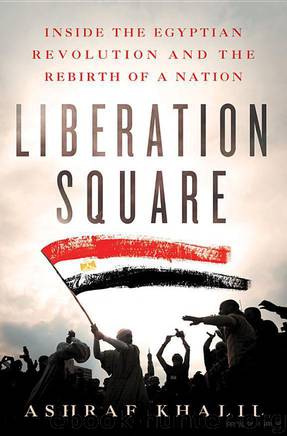Liberation Square by Ashraf Khalil

Author:Ashraf Khalil
Language: eng
Format: mobi
Tags: Non-Fiction, bought-and-paid-for
ISBN: 9781250006691
Publisher: Macmillan
Published: 2012-01-03T05:00:00+00:00
9
The Fall of the Police State
Much has been made of the near-obsessive dedication to nonviolence on the part of the Tahrir square protesters. For the most part, that’s true. From the very start, one of the dominant chants from the protesters was salmeya, or peaceful.
But let’s pause now to acknowledge and honor the fact that Egypt’s nonviolent revolution wouldn’t have happened without some people who were willing to be extremely violent at times. Over a four-day period, a hard-core cadre of protesters confronted and physically shattered the Egyptian police state—overwhelming the shock troops of the Interior Ministry’s Central Security riot police. It was only after that vanguard had been physically destroyed and demoralized that the real revolution could begin.
Most popular uprisings boil down to very simple mathematics at some point. First, the people overwhelm the traditional security forces. At that point it becomes a question of whether the government in charge has the will to order its military to attack civilians, and then whether the military is willing to follow those orders. If both are willing, then you get Tiananmen Square; if not, then you get Tunisia.
It was on January 28 that Egyptians forced that dilemma onto Mubarak’s government by violently defeating Egypt’s Interior Ministry, essentially stripping away Mubarak’s armor and forcing him to genuinely deal with his people for the first time in decades. I witnessed scenes of incredible violence on January 28, with protesters using military-style organization and tactics to harass and pressure the police until they collapsed.
Across the city, protesters and security forces were making their final preparations. First thing in the morning, Mohamed El Dahshan headed to the local sporting goods store, just as Salem and others had done the day before. One of the random peripheral economic benefits of the Egyptian revolution seems to have been a massive spike in demand for swim goggles.
“I told the store owner, ‘I want cheap transparent swim goggles,’” El Dahshan said. “He laughed and replied, ‘Oh for the revolution? Well, all your friends bought this kind over here.’”
The day started with the final step of the government communications blackout. At about nine in the morning, all cell phones in the country went dead. I was on a rooftop in the west bank Nile-side district of Agouza preparing to be interviewed for the BBC, when one by one everybody’s cell phone signal died, including those with foreign Sim cards. A relative who saw me on television minutes later said I looked nervous and rattled—and I was. It was an intimidating move, not simply because the government chose to do it, but because of what it implied was coming next.
It didn’t matter. The communications shutdown came far too late to blunt the day’s events. Protest organizers basically bypassed the idea of coordination and communication altogether and just told people “Protest everywhere and don’t stop.” The government’s desperate move to strangle the flow of information didn’t hinder the demonstrators, and it didn’t stop the journalists from communicating what they witnessed to the world.
Download
This site does not store any files on its server. We only index and link to content provided by other sites. Please contact the content providers to delete copyright contents if any and email us, we'll remove relevant links or contents immediately.
| Arms Control | Diplomacy |
| Security | Trades & Tariffs |
| Treaties | African |
| Asian | Australian & Oceanian |
| Canadian | Caribbean & Latin American |
| European | Middle Eastern |
| Russian & Former Soviet Union |
The Secret History by Donna Tartt(19097)
The Social Justice Warrior Handbook by Lisa De Pasquale(12192)
Thirteen Reasons Why by Jay Asher(8915)
This Is How You Lose Her by Junot Diaz(6891)
Weapons of Math Destruction by Cathy O'Neil(6282)
Zero to One by Peter Thiel(5805)
Beartown by Fredrik Backman(5761)
The Myth of the Strong Leader by Archie Brown(5511)
The Fire Next Time by James Baldwin(5451)
How Democracies Die by Steven Levitsky & Daniel Ziblatt(5221)
Promise Me, Dad by Joe Biden(5155)
Stone's Rules by Roger Stone(5089)
A Higher Loyalty: Truth, Lies, and Leadership by James Comey(4965)
100 Deadly Skills by Clint Emerson(4929)
Rise and Kill First by Ronen Bergman(4792)
Secrecy World by Jake Bernstein(4755)
The David Icke Guide to the Global Conspiracy (and how to end it) by David Icke(4721)
The Farm by Tom Rob Smith(4516)
The Doomsday Machine by Daniel Ellsberg(4492)
